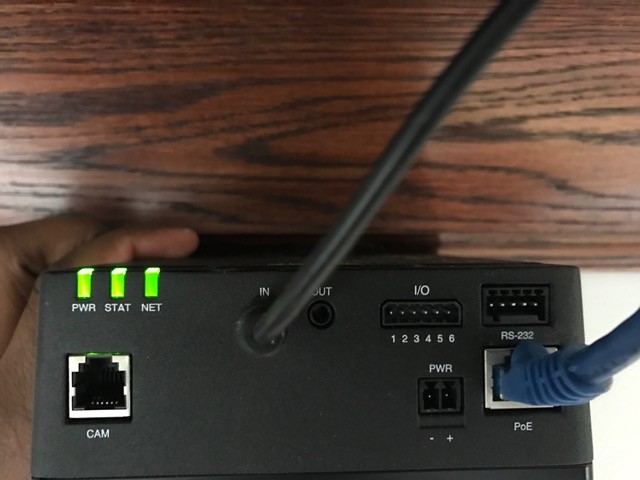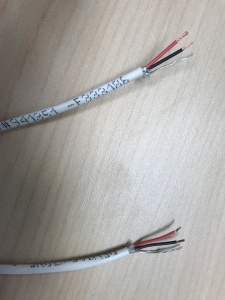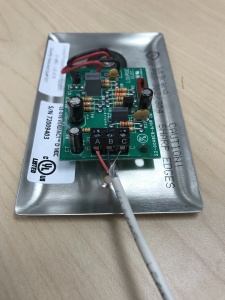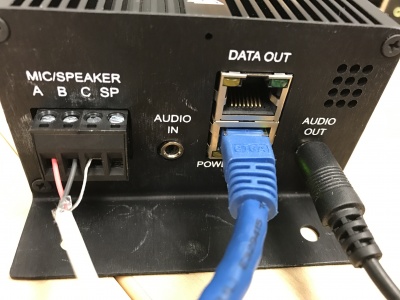Difference between revisions of "Installing an Axis F41 and Axis F1025 sensor unit with a Louroe Verifact D Microphone"
IVSWikiBlue (talk | contribs) (→Installation Instructions) |
IVSWikiBlue (talk | contribs) (→Installation Instructions) |
||
| Line 37: | Line 37: | ||
#Locate the network drop above the ceiling either being a male Ethernet end (service loop) or a biscuit jack. This will have been ran back to the POE switch. If the switch does not have POE, a POE injector will need to be installed at the network closet. | #Locate the network drop above the ceiling either being a male Ethernet end (service loop) or a biscuit jack. This will have been ran back to the POE switch. If the switch does not have POE, a POE injector will need to be installed at the network closet. | ||
| − | #Using T10 bit, remove the rubber feet from the bottom of the Axis F41 Main Unit, and replace it with the Axis F8001. This will allow the F41 to be mounted to drywall above | + | #Using the T10 bit, remove the rubber feet from the bottom of the Axis F41 Main Unit, and replace it with the Axis F8001. This will allow the F41 to be mounted to drywall above the drop ceiling. |
| − | #Find the | + | #Find the a suitable mounting location for the F41. Using four anchors and screws (or wall dogs), mount the F41 into the drywall above the drop ceiling. (Note, if there is no drop ceiling make other arrangements for mounting.) |
| − | #Connect the network drop | + | #Connect the network drop to the Axis F41 Main Unit. When connected, the '''NET''', '''STATUS''', and '''POWER''' LEDs will show green on the unit. After approximately one minute, all three indicators should be green. If not, troubleshoot connections. |
| − | |||
| − | |||
#:[[File:F41 No Cam Wired.jpg|400x300]] | #:[[File:F41 No Cam Wired.jpg|400x300]] | ||
#Cut a hole into the drywall, large enough to fit the mud ring into it securely. (If mounting on a hard surface, attach Datacom box to the wall). Run the attached RJ-11 cable behind the drywall to the input labeled '''CAM''' on the Axis F41 Main Unit. | #Cut a hole into the drywall, large enough to fit the mud ring into it securely. (If mounting on a hard surface, attach Datacom box to the wall). Run the attached RJ-11 cable behind the drywall to the input labeled '''CAM''' on the Axis F41 Main Unit. | ||
Revision as of 10:43, 7 April 2020
Required Parts And Tools
- Axis F41 Main Unit
- Axis F1025
- Axis F8001
- 3.5mm (Male to Male) Audio Cable
- Louroe Verifact D Microphone
- S2 TT10 Torx security bit
- Wire Stripper
- Wall Dog Screw Anchor
- Anchors and Screws
- Toggle Bolts (If mounting to drop ceiling tile)
- Drill bit and drill
- Phillips head drill bit or Phillips head screwdriver
- Small Flat head screwdriver
- Cat5/6 Patch Cable (7ft-15ft recommended)
- 22/2 Gauge Wire
- 2 Mud rings if mounting Verifact D Mic to drywall, Datacom box if mounting to hard surface (ex. Cinderblock)
- Drywall Saw
- 1 blank single gang wall plate with 1/4" cut hole
Installation Instructions
- Locate the network drop above the ceiling either being a male Ethernet end (service loop) or a biscuit jack. This will have been ran back to the POE switch. If the switch does not have POE, a POE injector will need to be installed at the network closet.
- Using the T10 bit, remove the rubber feet from the bottom of the Axis F41 Main Unit, and replace it with the Axis F8001. This will allow the F41 to be mounted to drywall above the drop ceiling.
- Find the a suitable mounting location for the F41. Using four anchors and screws (or wall dogs), mount the F41 into the drywall above the drop ceiling. (Note, if there is no drop ceiling make other arrangements for mounting.)
- Connect the network drop to the Axis F41 Main Unit. When connected, the NET, STATUS, and POWER LEDs will show green on the unit. After approximately one minute, all three indicators should be green. If not, troubleshoot connections.
- Cut a hole into the drywall, large enough to fit the mud ring into it securely. (If mounting on a hard surface, attach Datacom box to the wall). Run the attached RJ-11 cable behind the drywall to the input labeled CAM on the Axis F41 Main Unit.
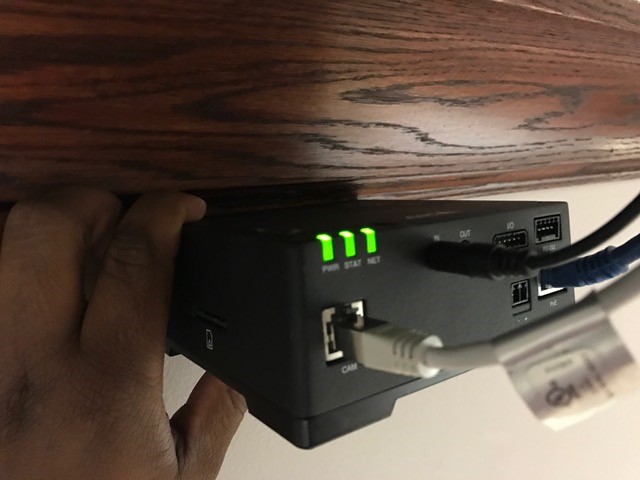
- Mount Axis F1025 to single gang wall plate, aligning the camera with the center cut hole. Once established, secure the faceplate to the mud ring.
Connecting the Microphone
- Strip the jacket off the 22/2, revealing the red, black, and common (bare wire) on both sides of the cable. Remove the string and plastic casings covering the red and black cables. Strip the red and black jackets off the wire exposing the copper. Cut copper evenly on both ends (See picture)
- Cut a hole into the drywall, large enough to fit the mud ring into it securely. Feed one end of the the 22/2 audio cable through the hole. (If mounting on a hard surface, attached Datacom box to the wall). Connect the audio cable to the Verifact-D phoenix terminal as follows; Red to A, Black to B, Common (bare wire) to C (See Picture)
- Connect the other end of your 22/2 cable to the terminal on the IFPX labeled MIC/SPEAKER A B C SP. The connections will be as follows; Red to A, Black to B, Common (bare wire) to C (See Picture)
- Align Verifact-D with mud ring or Datacom box and screw in securely.











